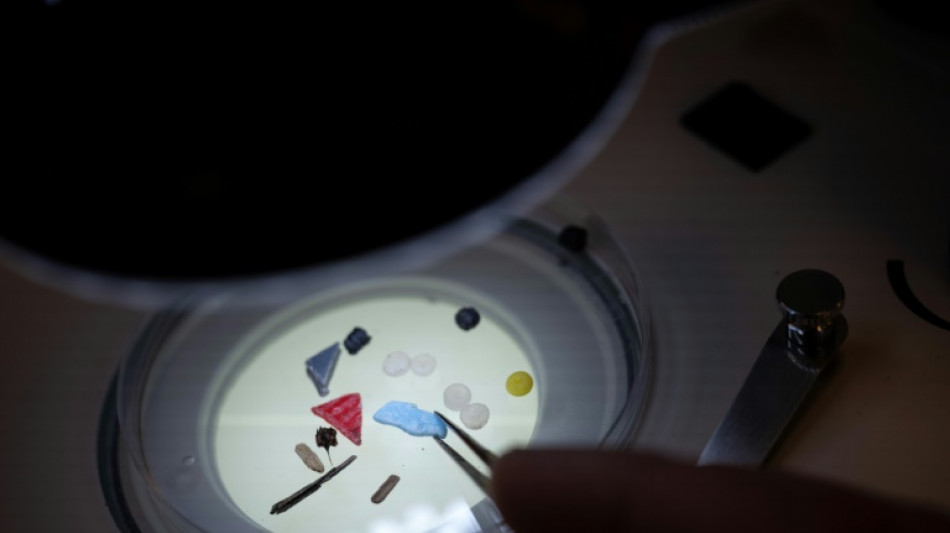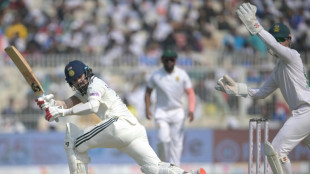
-
 Reyna, Balogun on target for USA in 2-1 win over Paraguay
Reyna, Balogun on target for USA in 2-1 win over Paraguay
-
Japa's Miura and Kihara capture Skate America pairs gold

-
 Who can qualify for 2026 World Cup in final round of European qualifiers
Who can qualify for 2026 World Cup in final round of European qualifiers
-
UK to cut protections for refugees under asylum 'overhaul'

-
 England's Tuchel plays down records before final World Cup qualifier
England's Tuchel plays down records before final World Cup qualifier
-
Depoortere double helps France hold off spirited Fiji

-
 Scotland face World Cup shootout against Denmark after Greece defeat
Scotland face World Cup shootout against Denmark after Greece defeat
-
Hansen hat-trick inspires Irish to record win over Australia

-
 Alcaraz secures ATP Finals showdown with 'favourite' Sinner
Alcaraz secures ATP Finals showdown with 'favourite' Sinner
-
UK to cut protections for refugees under asylum 'overhaul': govt

-
 Spain, Switzerland on World Cup brink as Belgium also made to wait
Spain, Switzerland on World Cup brink as Belgium also made to wait
-
Sweden's Grant leads by one at LPGA Annika tournament

-
 Scotland cling to hopes of automatic World Cup qualification despite Greece defeat
Scotland cling to hopes of automatic World Cup qualification despite Greece defeat
-
Alcaraz secures ATP Finals showdown with great rival Sinner

-
 England captain Itoje savours 'special' New Zealand win
England captain Itoje savours 'special' New Zealand win
-
Wales's Evans denies Japan historic win with last-gasp penalty

-
 Zelensky renews calls for more air defence after deadly strike on Kyiv
Zelensky renews calls for more air defence after deadly strike on Kyiv
-
NBA's struggling Pelicans sack coach Willie Green

-
 Petain tribute comments raise 'revisionist' storm in France
Petain tribute comments raise 'revisionist' storm in France
-
Spain on World Cup brink as Belgium also made to wait

-
 Spain virtually seal World Cup qualification in Georgia romp
Spain virtually seal World Cup qualification in Georgia romp
-
M23, DR Congo sign new peace roadmap in Doha

-
 Estevao, Casemiro on target for Brazil in Senegal win
Estevao, Casemiro on target for Brazil in Senegal win
-
Ford steers England to rare win over New Zealand

-
 Massive march in Brazil marks first big UN climate protest in years
Massive march in Brazil marks first big UN climate protest in years
-
Spain rescues hundreds of exotic animals from unlicensed shelter

-
 Huge fire sparked by explosions near Argentine capital 'contained'
Huge fire sparked by explosions near Argentine capital 'contained'
-
South Africa defy early red card to beat battling Italy

-
 Sinner beats De Minaur to reach ATP Finals title match
Sinner beats De Minaur to reach ATP Finals title match
-
Zelensky vows overhaul of Ukraine's scandal-hit energy firms

-
 South Africa defy early red card to beat Italy
South Africa defy early red card to beat Italy
-
Alex Marquez claims Valencia MotoGP sprint victory

-
 McIlroy shares lead with Race to Dubai title in sight
McIlroy shares lead with Race to Dubai title in sight
-
Climate protesters rally in Brazil at COP30 halfway mark

-
 Spike Lee gifts pope Knicks jersey as pontiff meets film stars
Spike Lee gifts pope Knicks jersey as pontiff meets film stars
-
BBC caught in crossfire of polarised political and media landscape

-
 'Happy' Shiffrin dominates in Levi slalom for 102nd World Cup win
'Happy' Shiffrin dominates in Levi slalom for 102nd World Cup win
-
Palestinian national team on 'mission' for peace in Spain visit

-
 Brazilian 'Superman' cheers child cancer patients in Ghana
Brazilian 'Superman' cheers child cancer patients in Ghana
-
India close in on win over South Africa after Jadeja heroics

-
 Huge explosions rock industrial area near Argentina's capital
Huge explosions rock industrial area near Argentina's capital
-
Bezzecchi takes pole for Valencia sprint and MotoGP

-
 Dominant Shiffrin leads after first slalom run in Levi
Dominant Shiffrin leads after first slalom run in Levi
-
Nine killed in accidental explosion at Indian Kashmir police station

-
 Climate protesters to rally at COP30's halfway mark
Climate protesters to rally at COP30's halfway mark
-
Fighting South Africa lose Rickelton after India 189 all out

-
 Harmer leads South Africa fightback as India 189 all out
Harmer leads South Africa fightback as India 189 all out
-
Prison looms for Brazil's Bolsonaro after court rejects his appeal

-
 EU bows to pressure on loosening AI, privacy rules
EU bows to pressure on loosening AI, privacy rules
-
India close in on lead despite South African strikes


'Alarming' microplastic pollution in Europe's great rivers
"Alarming" levels of microplastic have been found in major rivers across Europe according to scientists in 14 studies published simultaneously Monday.
"The pollution is present in all European rivers" studied, said French scientist Jean-François Ghiglione, who coordinated the large-scale operation across nine major rivers from the Thames to the Tiber.
"Alarming" pollution of on average "three microplastics per cubic metre of water" was observed in all of them, according to the results published in the journal of Environmental Science and Pollution Research.
This is far from the 40 microplastics per cubic metre recorded in the world's 10 most polluted rivers -- the Yellow River, Yangtze, Mekong, Ganges, Nile, Niger, Indus, Amur, Pearl and Hai -- which irrigate countries where most plastic is produced or plastic waste is processed.
But this does not take into account the volume of water flowing.
- 3,000 particles per second -
On the Rhone in Valence, France, the fast flow means there are "3,000 plastic particles every second", said Ghiglione. The Seine in Paris has around 900 per second.
"The mass of microplastics invisible to the naked eye is more significant than that of the visible ones," said Ghiglione -- a result that "surprised" researchers. This was confirmed by analytical advances made during the studies, which began in 2019.
"Large microplastics float and are collected at the surface, while invisible ones are distributed throughout the water column and are ingested by many animals and organisms," said Ghiglione, head of research in marine microbial ecotoxicology at the French National Centre for Scientific Research (CNRS).
Samples were collected from the mouths of the rivers Elbe, Ebro, Garonne, Loire, Rhone, Rhine, Seine, Thames and the Tiber by some 40 chemists, biologists and physicists from 19 research laboratories.
The researchers then made their way upstream until they reached the first major city on each of the waterways.
"Microplastics are smaller than a grain of rice," said Alexandra Ter Halle, a chemist at the CNRS in Toulouse, who took part in the analysis.
- 'Mermaid tears' -
The particles are less than five millimetres in size, with the smallest invisible to the naked eye.
These include synthetic textile fibres from washing clothes and microplastics released from car tyres or when unscrewing plastic bottle caps.
Researchers also found virgin plastic pellets, the raw granules used to manufacture plastic products.
One of the studies identified a virulent bacterium on a microplastic in the Loire in France, capable of causing infections in humans.
Another unexpected finding was that a quarter of microplastics discovered in rivers are not derived from waste but come from industrial plastic pellets.
These granules, dubbed "mermaid tears", can also sometimes be found scattered along beaches after maritime incidents.
"What we see is the pollution is diffuse and established" and "comes from everywhere" in the rivers, he added.
"The international scientific coalition we are part of (as part of international UN negotiations on reducing plastic pollution) is calling for a major reduction in the production of primary plastic because we know that plastic production is directly linked to pollution," he said.
I.Saadi--SF-PST




